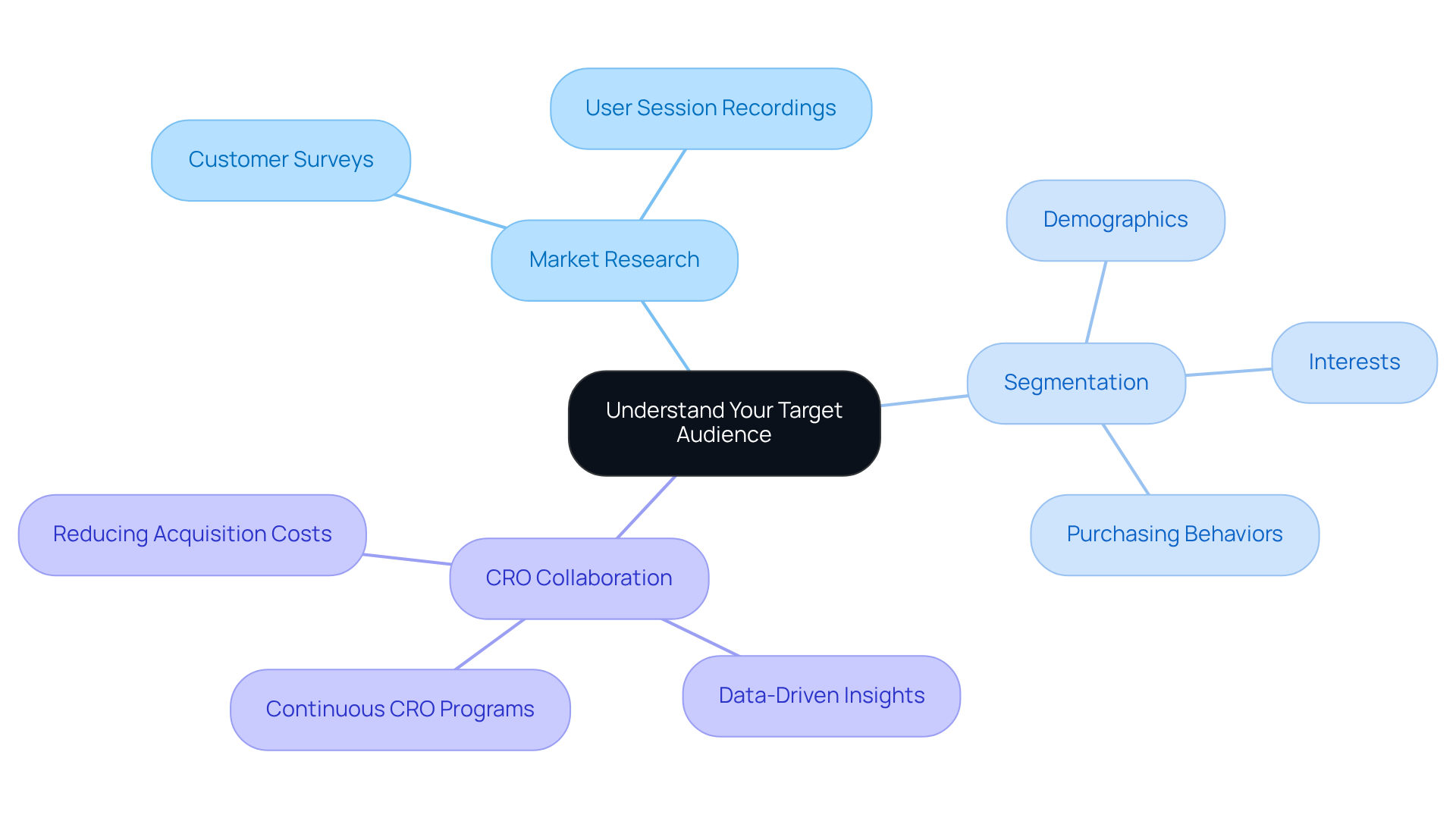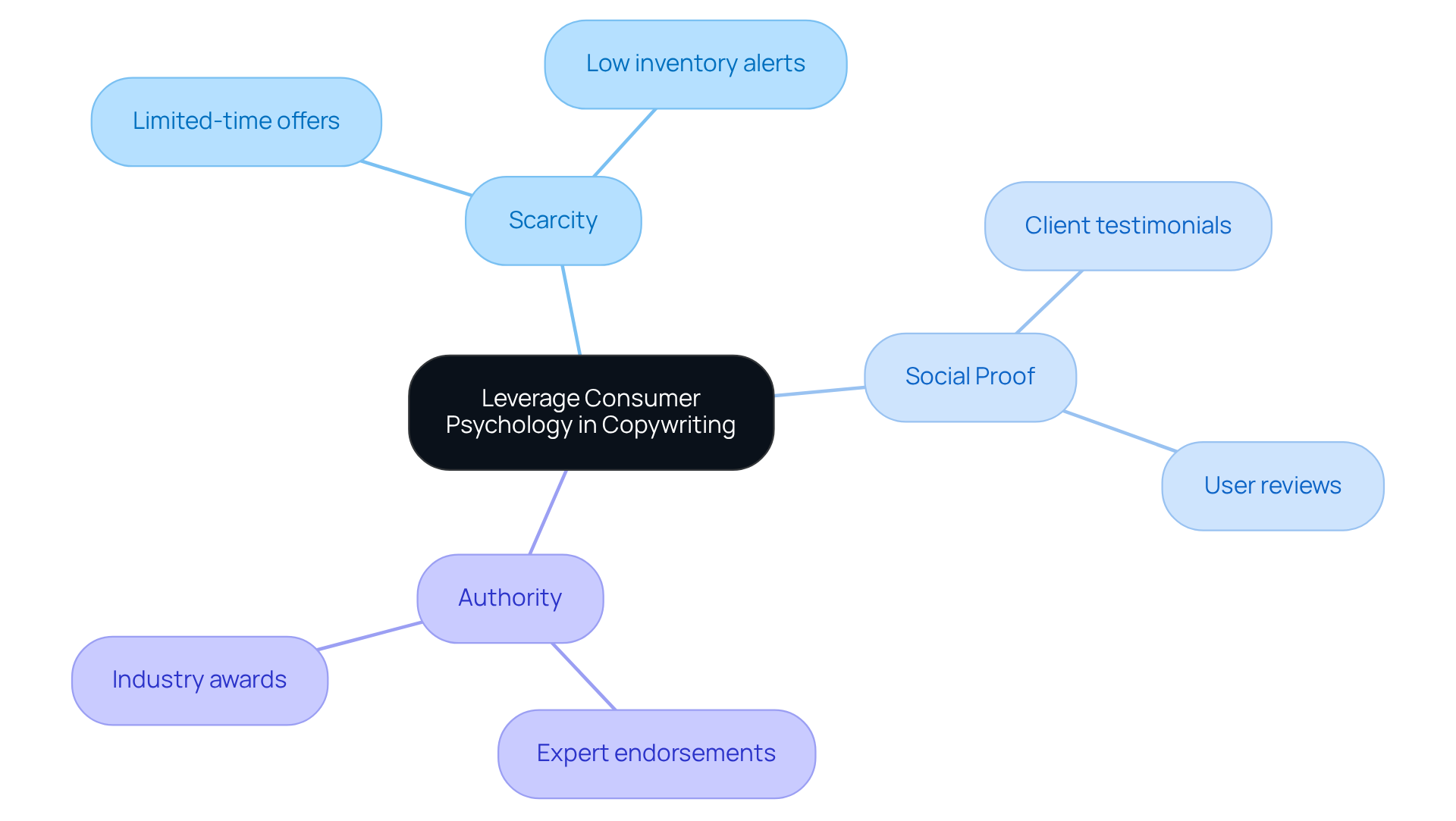
Overview
This article delineates four proven practices that empower Direct-to-Consumer (DTC) brands to amplify their marketing effectiveness and conversion rates. It underscores the critical importance of:
- Comprehending the target audience
- Harnessing consumer psychology in copywriting
- Formulating clear messages
- Executing A/B testing
Each practice is bolstered by strategies designed to ensure that marketing initiatives resonate with consumers and evolve continuously based on data-driven insights.
Introduction
In an increasingly competitive landscape, direct-to-consumer (DTC) brands confront the urgent challenge of distinguishing themselves and forging meaningful connections with their audience. Mastering essential practices—such as:
- Understanding target demographics
- Leveraging consumer psychology
- Crafting compelling messages
- Implementing A/B testing
enables these brands to significantly enhance their marketing effectiveness. Yet, a critical question persists: how can DTC companies effectively balance these strategies to attract and retain loyal customers in a market overflowing with options?
Understand Your Target Audience
To effectively enhance conversion rates, DTC companies must first establish a comprehensive understanding of their target consumers. This necessitates rigorous market research, employing tools such as customer surveys and analyzing user session recordings to collect valuable data on customer preferences and behaviors.
By segmenting the target demographic based on factors like demographics, interests, and purchasing behaviors, companies can tailor their marketing strategies to meet the specific needs of each segment. For instance, a brand that specializes in eco-friendly products may find that its customers prioritize sustainability and ethical sourcing—elements that should be prominently reflected in its messaging and product offerings.
This targeted approach not only boosts client engagement but also significantly elevates success rates by ensuring that marketing efforts resonate with the intended audience.
Collaborating with a proficient CRO agency like Parah Group can further enhance these initiatives. Parah Group is committed to profitability and sustainable growth, leveraging data-driven insights to refine strategies and optimize outcomes effectively. Their methodology involves implementing continuous CRO programs that facilitate data-informed decision-making, ultimately reducing acquisition costs and enhancing profitability.

Leverage Consumer Psychology in Copywriting
Integrating consumer psychology into copywriting is essential for DTC companies aiming to enhance conversions. Techniques such as:
- Scarcity—exemplified by limited-time offers
- Social proof, illustrated through client testimonials
- Authority, represented by endorsements from experts
serve as powerful motivators for potential buyers. For instance, a company might highlight that only a limited number of items remain in inventory, generating urgency and encouraging buyers to make quicker purchasing decisions. Moreover, employing relatable language and narrative techniques fosters an emotional connection with the audience, significantly increasing their likelihood of engaging with the company. By understanding and applying these psychological principles, companies can create compelling text that not only boosts conversions but also enhances client loyalty.

Craft Clear and Compelling Messages
Crafting clear and compelling messages stands as a cornerstone of effective marketing for DTC companies. Brands must concentrate on articulating their distinct value propositions with precision, ensuring that prospective clients can swiftly grasp what sets them apart from rivals. This requires the use of straightforward language, the avoidance of jargon, and a focus on benefits rather than features.
For instance, instead of merely stating that a product is crafted from premium materials, a company should highlight how these materials enhance the user's experience or resolve a specific issue.
Furthermore, integrating strong calls to action (CTAs) can effectively guide customers toward subsequent steps, whether that involves making a purchase or subscribing to a newsletter.
By prioritizing clarity and relevance in communication, companies can significantly elevate their success rates.

Implement A/B Testing for Continuous Improvement
Implementing a test copy through A/B testing is an essential practice for DTC brands striving for continuous improvement in their marketing efforts. This method allows brands to compare two versions of a webpage, email, or ad, determining which one performs better in terms of conversion rates.
By testing various elements in the test copy—such as headlines, images, CTAs, and overall layout—brands can identify what resonates most with their audience. For example, a company might evaluate two different headlines for an email campaign to ascertain which one generates more clicks.
Analyzing these results empowers companies to make informed decisions that enhance their marketing strategies, ultimately leading to higher conversion rates. Regularly conducting A/B tests not only ensures that brands remain agile and responsive to consumer behavior but also fosters a culture of continuous optimization.

Conclusion
Understanding the intricacies of direct-to-consumer (DTC) marketing is vital for brands aiming to excel in a competitive landscape. By emphasizing core principles such as:
- Audience comprehension
- Psychological insights in copywriting
- Clear messaging
- Implementation of A/B testing
DTC brands can significantly elevate their marketing effectiveness and conversion rates.
Thorough comprehension of target audiences through market research and segmentation is paramount; this allows brands to tailor their strategies effectively. Moreover, leveraging consumer psychology in copywriting fosters emotional connections and drives urgency, while crafting clear and compelling messages ensures that unique value propositions resonate with potential customers. The practice of A/B testing empowers brands to continuously refine their marketing efforts based on data-driven insights.
In the ever-evolving DTC landscape, embracing these proven practices is not merely beneficial but essential for sustainable growth. Prioritizing a deep understanding of consumer behavior and employing strategic methodologies enables brands to cultivate stronger connections with their audience, ultimately leading to increased loyalty and profitability. Taking decisive action on these insights can position DTC brands on a trajectory toward success, making it imperative to integrate these strategies into everyday marketing practices.
Frequently Asked Questions
Why is understanding the target audience important for DTC companies?
Understanding the target audience is crucial for DTC companies to enhance conversion rates. It involves rigorous market research to gather data on customer preferences and behaviors, allowing companies to tailor their marketing strategies effectively.
What methods can companies use to understand their target consumers?
Companies can use methods such as customer surveys and analyzing user session recordings to collect valuable data about customer preferences and behaviors.
How can demographic segmentation benefit marketing strategies?
By segmenting the target demographic based on factors like demographics, interests, and purchasing behaviors, companies can create tailored marketing strategies that meet the specific needs of each segment, leading to improved client engagement and success rates.
What example illustrates the importance of targeted messaging?
A brand that specializes in eco-friendly products may find that its customers prioritize sustainability and ethical sourcing. These elements should be prominently reflected in its messaging and product offerings to resonate with the audience.
How can collaborating with a CRO agency enhance marketing efforts?
Collaborating with a proficient CRO agency like Parah Group can enhance marketing efforts by leveraging data-driven insights to refine strategies and optimize outcomes. They implement continuous CRO programs that facilitate informed decision-making, helping to reduce acquisition costs and enhance profitability.
FAQs











